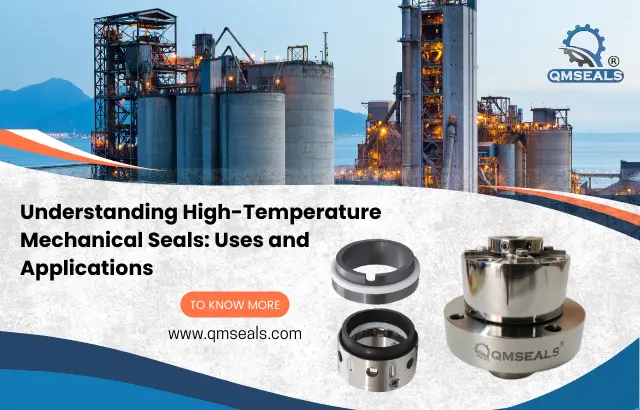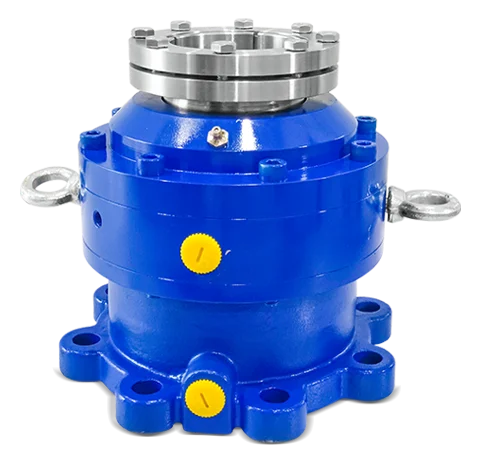Posted At: Mar 10, 2025 - 1,879 Views

Understanding High-Temperature Mechanical Seals: Applications and Uses
For industrial uses where harsh conditions are common, reliability and efficiency of the equipment are essential. Among the most essential equipment in such environments is the high-temperature seal, engineered to resist high temperatures while offering performance and longevity. It is an important component for pumps, compressors, and rotating equipment, where dealing with heat, pressure, and corrosive fluids is a common threat.
In this comprehensive guide, we will explore what high-temperature mechanical seals are, their applications, and the importance of selecting the right mechanical seal material to ensure long-term efficiency.
What Is a High-Temperature Mechanical Seal?
High-temperature mechanical seal is a sealing device that can effectively function under high-temperature conditions, usually in applications where temperatures are more than 300°C (572°F). Such seals are specially developed to avoid leakage in high-pressure pump seals, turbines, and other equipment that rotates.
Major Features of High-Temperature Seals:
Heat-resistant materials: Made with advanced mechanical seal materials like carbon, silicon carbide, tungsten carbide, and graphite.
Durability in stress: Built to resist thermal expansion, high pressure, and hostile chemicals.
Sealing performance improvement: Allows for little leakage during fluid handling, such as steam, hydrocarbons, and corrosive chemicals.
Compatibility with high-speed equipment: Applied where high-speed rotation and high pressure are encountered in heavy-duty industrial use.
Applications of High-Temperature Mechanical Seals
1. Power Generation Plants
Power plants are based on mechanical seals with high temperature in turbines, pumps, and steam systems. These mechanical seals ensure no leakage of fluid during high temperatures and ensure that the power generation process is efficient.
2. Oil and Gas Industry
The oil and gas industry works in extremely harsh conditions with high temperatures and pressures prevailing most of the time. Seals with high temperatures are necessary for avoiding leakage of high-pressure pump seals, compressors, and drilling rigs.
3. Chemical Industries
High-temperature and aggressive fluids need expert sealing solutions. Mechanical high-temperature seals find their applications in reactors, chemical transfer pumps, and distillation columns in order to provide safety and reliability in operation.
4. Aerospace and Automotive Industries
Jet engines, turbochargers, and exhaust systems in aerospace and automotive applications need high-temperature seals for optimum performance in hot operating conditions.
5. Food Processing and Pharmaceuticals
Industries like food processing and pharmaceuticals require specialized temperature seals to maintain hygiene while handling hot fluids and gases in sterilization and processing units.
What Temperature Can Be Used in High-Temperature Seals?
High-temperature mechanical seals are engineered to endure harsh conditions, providing stable performance in challenging applications. The temperature range of a high-temperature seal varies based on the mechanical seal material, the fluid being processed, and the pressure conditions.
General Temperature Ranges
Ordinary mechanical seals perform well up to 200°C (392°F), typically applied in moderate industrial processes.
There are specialized high-temperature mechanical seals that can withstand very high temperatures ranging from 200°C to 400°C (752°F).
High-performance material-based temperature seals, which are advanced, can tolerate above 400°C (752°F) and find application in the very harsh conditions of power plants and chemical processing.
A decision on the choice of mechanical seal material is one of the decisive factors in measuring temperature resistance. Carbon, ceramic, tungsten carbide, silicon carbide, and top-grade alloys are some of the most common seal materials applied at high temperatures and chosen for how well they perform under intense heat while being enduring.
Types of Mechanical Seal Materials Used in High-Temperature Seals
Selecting the proper mechanical seal material is critical to achieving long-term performance and efficiency in high-temperature applications. The following are some of the most popular materials used:
1. Carbon-Based Seals
Good heat resistance and chemical compatibility.
Typically applied in dry-running and lubricated applications.
2. Silicon Carbide (SiC) Seals
Highly durable and resistant to thermal shock.
Applied in high-speed pumps and high-pressure applications.
3. Tungsten Carbide Seals
Provides better hardness and wear resistance.
Suitable for use in applications involving abrasive liquids and intense heat.
4. Graphite Seals
Exceptional thermal conductivity and self-lubricating properties.
Mostly used in high-heat applications like boilers and reactors.
5. PTFE (Polytetrafluoroethylene) Seals
Excellent chemical resistance and good tolerance to high temperatures.
Frequently applied in pharmaceutical and food processing sectors.
What Temperature Can Be Used in Different Types of Pumps?
Pumps work in different industries with specific temperatures and pressures. The choice of a high-temperature seal varies with the pump type and the process conditions.
1. Centrifugal Pumps
Centrifugal pumps are extensively applied in oil refineries, power plants, and chemical processing. The pumps work most typically in moderate temperatures. Conventional mechanical seals may tolerate up to 200°C, but for processes of handling superheated fluids or thermal oils, high-temperature mechanical seals of 300°C to 400°C rating need to be used.
2. High-Pressure Pumps
High-pressure pump systems utilized in power plants, boiler feedwater service, and industrial process plants frequently need high-pressure pump seals that can withstand extreme temperatures as well as large pressure fluctuations. Such temperature seals need to be constructed of advanced carbides and alloys in order to sustain constant exposure to temperatures in excess of 350°C while sustaining a leak-free seal under high stress.
3. Rotary Pumps
Rotary pumps in heavy-duty applications usually handle viscous fluids and high-temperature conditions. Seals for rotary pumps must be chosen according to the type of fluid, as aggressive chemicals and high temperatures necessitate materials such as silicon carbide or tungsten carbide for increased heat and corrosion resistance.
4. Boiler Feed Pumps
Boiler feed pumps run at incredibly high temperatures, often above 400°C. To survive under such harsh conditions, mechanical high-temperature applications employ special-purpose designs with metal bellows and graphite-loaded faces to provide endurance and leak-tight performance withstanding high thermal stress.
What Are the Highest and Lowest Temperature Seals?
When choosing a temperature seal, it is necessary to take into consideration both the highest and lowest temperatures at which the equipment will be operating to ensure the optimum performance and longevity.
Highest Temperature Seals
For very high-temperature applications, mechanical seals are made to endure constant exposure to high temperatures. Some of the most thermally resistant seals are:
Metal Bellows Seals: Made to operate up to 425°C (797°F), typically used in high-temperature industrial processes.
Graphite Seals: Withstand harsh temperatures above 600°C (1112°F) and find applications in aerospace and high-temperature chemical processing.
Silicon Carbide Seals: Advanced mechanical seals that offer superior thermal resistance to 400°C (752°F) while providing maximum wear resistance.
Lowest Temperature Seals
Besides high-temperature resistance, certain seals have to operate at very low-temperature conditions, e.g., cryogenic services. Low-temperature mechanical seals are:
Elastomeric Seals: Basic elastomers may be used up to -40°C (-40°F), but special formulations support operation at still lower temperatures.
PTFE Seals (Teflon Seals): Are capable of running at temperatures of as low as -200°C (-328°F) and can be used for cryogenic pumps and liquefied gas use.
Metal Bellows Cryogenic Seals: Designed specifically for applications where durability at low temperature is needed but flexibility and strength must be maintained.
Factors to Consider When Selecting a High-Temperature Seal
When choosing a high-temperature mechanical seal, several aspects need to be considered to get the best performance:
1. Operating Temperature Range
Make sure the seal material is capable of withstanding the necessary temperature without deteriorating or failing.
2. Fluid Compatibility
Take into consideration the nature of the fluid being processed, whether steam, oil, gas, or chemical corrosives.
3. Pressure Conditions
Seals for high-pressure applications must be able to withstand harsh conditions without degrading.
4. Speed and Motion Requirements
Rotating equipment demands seals with low friction and high wear resistance.
5. Maintenance and Lifespan
Select seals that offer long service life with minimal maintenance requirements.
Advantages of Using High-Temperature Mechanical Seals
The use of high-temperature mechanical seals provides several advantages, making them indispensable in industrial operations:
1. Enhanced Equipment Efficiency
Reduces leakage, ensuring optimal performance of pumps and rotating machinery.
2. Increased Safety
Prevents hazardous fluid leaks, enhancing workplace safety in industries handling dangerous chemicals.
3. Prolonged Service Life
Temperature seals of high quality minimize wear and tear, enhancing the lifespan of industrial equipment.
4. Cost Savings
Reduces maintenance time and cost, resulting in enhanced operational efficiency.
5. Versatile Application
Applicable across a broad spectrum of industries, such as energy, manufacturing, aerospace, and pharmaceuticals.
Conclusion
High-temperature mechanical seals are critical parts used in industries that require trustworthy sealing solutions for severe heat environments. Selecting an appropriate mechanical seal for high temperature will help organizations achieve effective performance, lower downtime, and greater safety. It is necessary to select the suitable mechanical seal material and account for operational parameters in order to maximize performance and ensure long-term stability.
For industrial applications that need high-temperature seals and high-pressure pump seals, the use of high-quality high-temperature mechanical seals is essential in order to ensure efficiency, safety, and cost-effectiveness in industrial processes.
Frequently Asked Questions
1. What is a high-temperature mechanical seal?
A high-temperature mechanical seal is a type of sealing mechanism that is used to seal industrial equipment subjected to hostile heat environments. These mechanical seals provide long-lasting performance and efficiency in high-pressure and high-speed operating conditions.
2. What are the materials employed in high-temperature seals?
Typical mechanical seal materials for high-temperature use are carbon, silicon carbide, tungsten carbide, graphite, and PTFE. They offer resistance to heat, pressure, and chemical exposure.
3. Where are high-temperature mechanical seals employed?
They are employed in power generation, oil and gas, chemical processing, aerospace, automotive, and food processing industries where equipment is subjected to extreme heat conditions.
4. How do I select the appropriate high-temperature seal?
The appropriate high-temperature mechanical seal selection is based on operating temperature, fluid compatibility, pressure ratings, equipment speed, and maintenance needs.
5. How do high-temperature seals enhance pump performance?
High-temperature seals enable efficient operation by stopping fluid leaks, minimizing wear and tear, and prolonging high-pressure pump seal and rotating equipment life.


